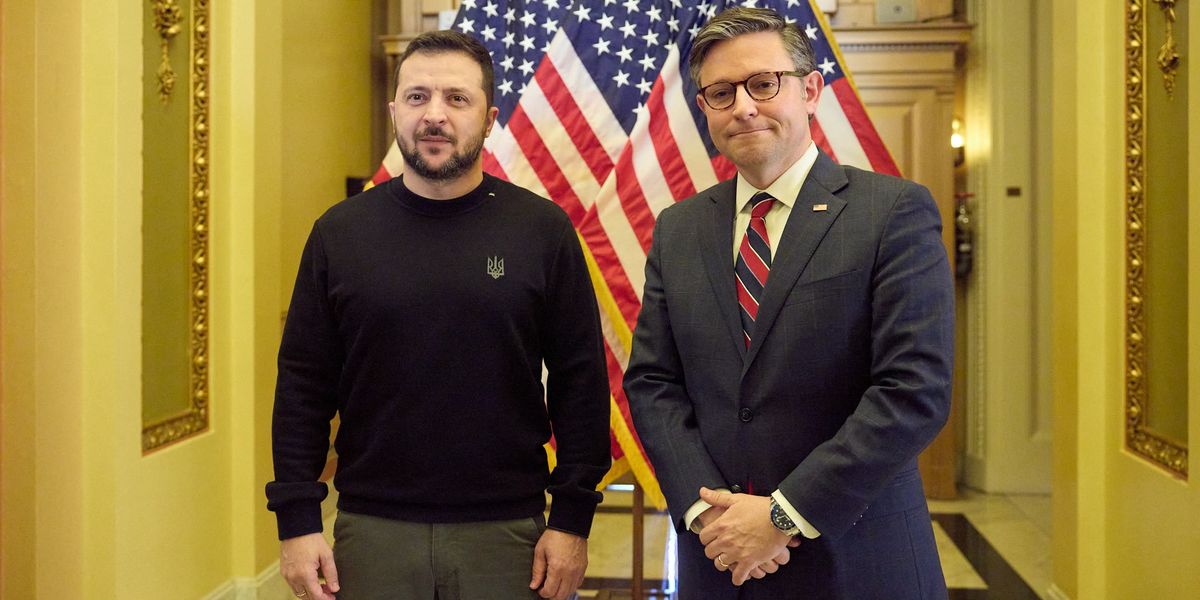In the debate over funding aid to Ukraine, both Republicans and Democrats are trapped in their own delusions. Congress needs to allocate the funding, but with a singular goal: to bring the war to a speedy conclusion.
Some Republicans appear to want to prevent funding for Ukraine simply to give a black eye to President Biden in an election year. This is no way to conduct foreign policy, let alone concerning matters of war and peace, where countless lives and the fate of independent Ukraine are at stake.
But some Republicans, among others, are asking an important question, one that we might call the David Petraeus query, who famously demanded about the war in Iraq back in 2003: “Tell me how this ends.” Unfortunately, the Biden administration, many Democrats, and other supporters of Ukraine have deflected from confronting that crucial question.
Ukraine’s leading military official, General Zaluzhny, recently labeled the war a stalemate. Months earlier, back in July of last year, U.S. general and chairman of the joint chiefs of staff Mark Milley accurately predicted that Ukraine’s counter-offensive would be very difficult, very long, and “very, very bloody.” Yet now, even with the battle lines essentially frozen, many are speaking about a “long war.”
Somehow, while 2024 will be a very difficult year for Ukraine, pundits and officials suggest a counteroffensive could be successful in 2025. It requires magical thinking to assume that another additional weapon system down the line will somehow tip the balance, yet not lead to a wider war or escalation with a nuclear-armed power, a risk that some commentators casually brush away.
Despite all the promise of 21st century war-fighting technology, the conflict has devolved into classic trench warfare. Some one hundred years after WWI, it is worth recalling that Britain alone suffered the loss of several hundred thousand of its troops. And yet the first and last British soldier killed in that war died within a few miles of each other.
Quite understandably, many Ukrainians want to continue fighting in the hopes of pushing the invaders out of their territory. But those of us at a distance who can afford to be more sober-minded must ask our Ukrainian friends the following: how much more death and destruction can realistically be exchanged for how much territory?
Further, Democratic supporters of Ukraine need to ponder whether continuing the war until 2025 is really in Ukraine’s interest. Donald Trump, the presumptive Republican nominee, has said if elected president he could end the war within 24 hours. If that’s true, how much of that outcome would be favorable to Ukraine?
Some will object that Putin has no interest in negotiating to end the conflict at this point. That is one question that can be tested. If he refuses, that refusal should be made clear, loudly and publicly. To be sure, Russia appears to be in a stronger position than Ukraine, on the surface at least. Yet there are clear signs of war weariness in Russia as well: its economy is in danger of overheating through both inflation and a labor shortage, and it is facing its own challenges of mobilizing sufficient troops, with wives and mothers of soldiers at the front openly protesting the prolonged deployment of their husbands and sons.
Some will claim that ending the war now will allow Putin to claim victory, having illegally seized close to twenty percent of Ukraine’s territory. He will certainly try to convince the Russian population of that. Yet absent territorial concessions, sanctions will almost certainly remain. While Russia is nowhere near imminent collapse, as some pundits have quixotically hoped, the long-term prospects for the Russian economy are grim.
With the end of the war the focus in Russian will turn inward, and the Russian people will start to ask whether all the dead souls, maimed bodies, and economic hardship was worth the seized and devastated lands that will take countless rubles to rebuild.
If Congress denies funding, Ukraine will be in a much weaker position to negotiate. It will essentially be left out to dry, and Congressional inaction will send a troubling message about U.S. backing to other countries around the world. Putin will be tempted to continue this war, indefinitely.
But the negotiations need to begin. In short, Republicans should fund aid to Ukraine. In exchange, Biden and the Democrats should promise to push for negotiations now to bring this war to an end.
- What really happens if Ukraine aid runs out? ›
- Is the House where Ukraine — and Israel — aid goes to die? ›
- How Biden can bypass Congress on Ukraine aid ›
- What will more aid to Ukraine accomplish? | Responsible Statecraft ›
- Congress needs answers before sending more aid to Ukraine | Responsible Statecraft ›
- Kicking the can down the crumbling road in Ukraine | Responsible Statecraft ›
- Why Zelensky won't be able to negotiate peace himself | Responsible Statecraft ›
- What I saw and heard about the Ukraine war in Moscow | Responsible Statecraft ›
- Biden team blows off deadline for Ukraine war strategy | Responsible Statecraft ›
- When will the war in Ukraine end? | Responsible Statecraft ›














